Mises, Ludwig von. Human Action: A Treatise on Economics
Подождите немного. Документ загружается.

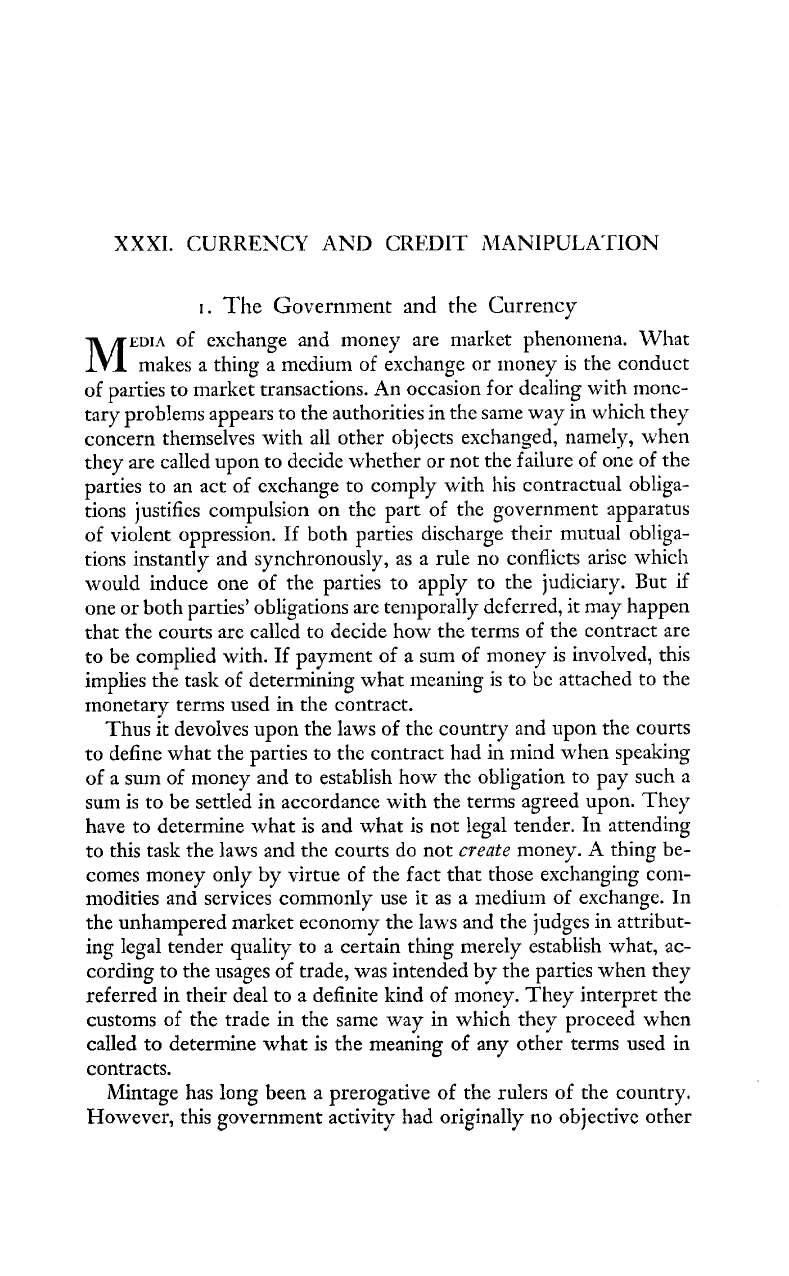
XXXI.
CURREXCY
AND
CREDIT &IANIPULATION
1.
The
Government and the Currency
M
EDIA
of exchange and money are n~arltet phenomena. What
makes a thing a medium of exchange or money is the conduct
of parties to market transactions. An occasion for dealing with rnonc-
tary problems appears to the authorities in the same way in which they
concern
themselves
with all other objects exchanged, namely, when
they are called upon to decide whether or not the failure of one of the
parties to an act of exchange to comply with his contractual obliga-
tions justifies compulsion on thc part of the government apparatus
of violent oppression. If both parties discharge their mutual obliga-
tions instantly and synchronously, as a rule no conflicts arisc which
would induce one of the parties to apply to the judiciary. But if
one or both parties' obligations are ten~porally deferred, it may happen
that the courts are called to decide how the terms of the contract are
to be complied with. If payment of a sum of money is involved, this
implies the task of determining what meaning is to be attached to the
monetary terms used in the contract.
Thus it devolves upon the laws of the country and upon the courts
to define what the parties to the contract had in mind when speaking
of a sum of money and to establish how the obligation to pay such a
sum is to be settled in accordance with the terms agreed upon. They
have to determine what is and what is not legal tender.
In
attending
to this task the laws and the courts do not
create
money.
A
thing be-
comes money only by virtue of the fact that those exchanging con+
n~odities and services commonly use
it
as a medium of exchange. in
the unhampered market economy the laws and the judges in attribut-
ing legal tender quality to a certain thing merely establish what, ac-
cording to the usages of trade, was intended by the parties when they
referred in their deal to a definite kind of money. They interpret the
customs of the trade in the same way in which they proceed when
called
to
determine what
is
the meaning of any other terms used in
contracts.
Mintage has long been a prerogative of the rulers of the country.
However, this government activity had originally no objective other
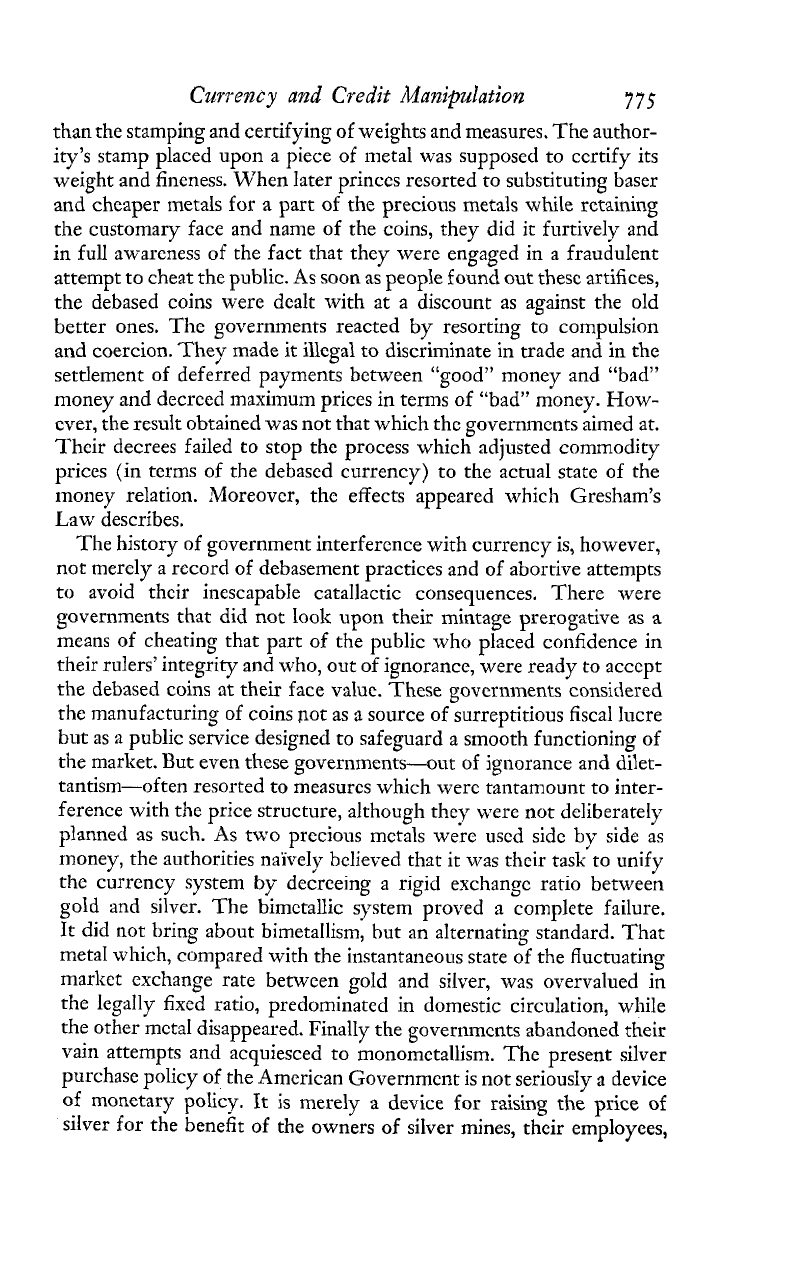
Currency and
Credit
Manipulation
775
than the stamping and certifying of weights and measures. The author-
ity's stamp placed upon
a
piece of metal was supposed to certify its
weight and fineness. When later princes resorted to substituting baser
and cheaper metals for a part
of
the precious metals while retaining
the customary face and name of the coins, they did it furtively and
in full awareness of the fact that they were engaged in a fraudulent
attempt to cheat the public. As soon as people found out these artifices,
the debased coins were dealt with at a discount as against the old
better ones. The governments reacted
by
resorting to compulsion
and coercion. They made it illegal to discriminate in trade and in the
settlement of deferred payments between "good" money and "bad"
money and decreed maximum prices in terms of "bad" money. How-
ever,
the result obtained
was
not that which the governmcnts aimed at.
Their decrees failed to stop the process which adjusted commodity
prices (in terms of the debased currency) to the actual state of the
money relation. Moreover, the effects appeared which Gresham's
Law
describes.
The history of government interfercnce with currency is, however,
not merely a record of debasement practices and of abortive attempts
to avoid their inescapable catallactic consequences. There were
governments that did not look upon their mintage prerogative as a
means of cheating that part of the public who placed confidence in
their rulers' integrity and who, out of ignorance, were ready to accept
the debased coins at their face value. These governments considered
the manufacturing of coins pot as
3
source of surreptitious fiscal lucre
but as a public service designed to safeguard a smooth functioning of
the market. But even these governments-out of ignorance and dilet-
tantism-often resorted to measures which were tantamount to inter-
ference with the price structure, although they were not deliberately
planned as such. As two precious mctals wek used side by side as
money, the authorities nai'vely hclieved that it was their task to unify
the currency system
by
decreeing a rigid exchange ratio between
gold and silver. The
bimetallic
system proved
a
complete failure.
It did not bring about bimetallism, but an alternating standard. That
metaI which, compared with the instantaneous state of the fluctuating
market exchange rate between gold and silver, was overvalued in
the legally fixed ratio, predominated in domestic circulation, while
the other mctal disappeared. Finally the governincnts abandoned their
vain attempts and acquiesced to monometallism. The present silver
purchase policy of the American Government is not seriously a device
of monetary policy. It is merely a device for raising the price
of
silver for the benefit of the owners of silver mines, their employees,
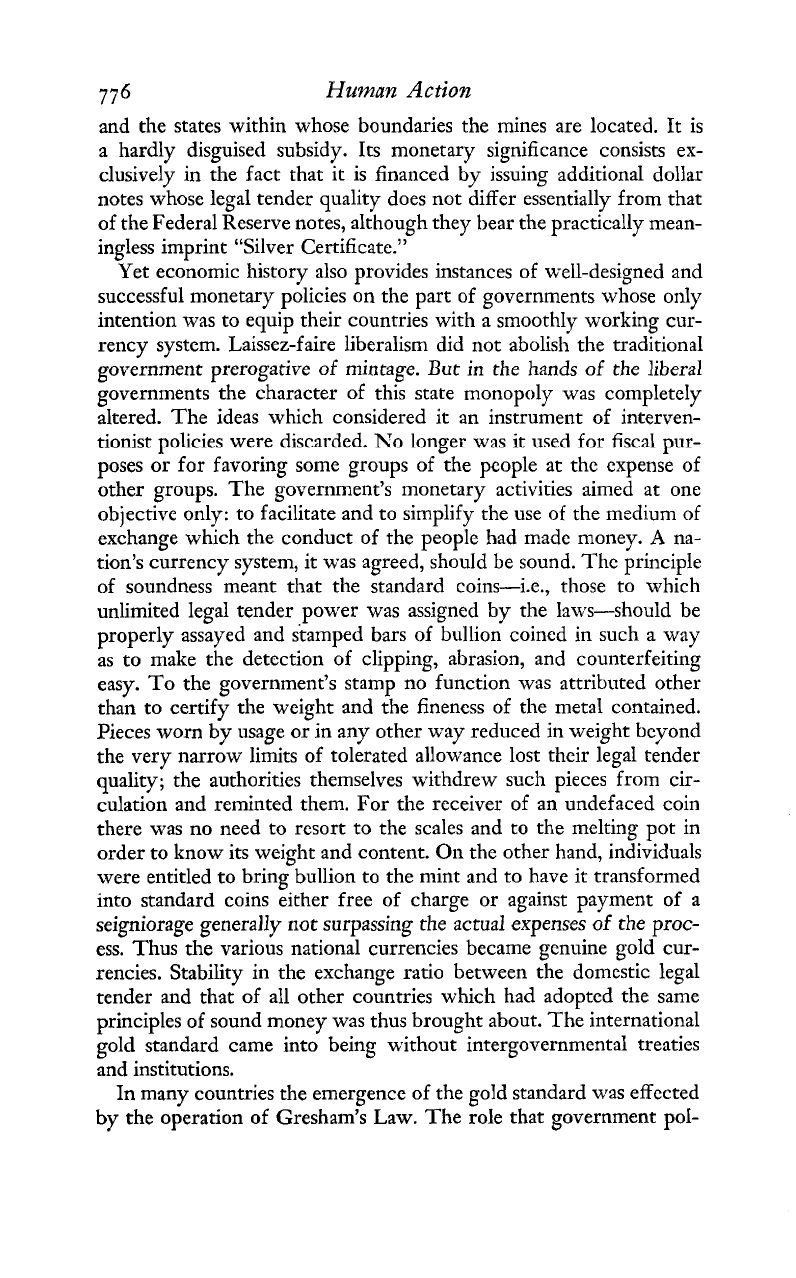
776
Human
Action
and the states within whose boundaries the mines are located. It is
a hardly disguised subsidy. Its monetary significance consists ex-
clusively in the fact that it is financed by issuing additional dollar
notes whose legal tender quality does not differ essentially from that
of the Federal Reserve notes, although they bear the practically mean-
ingless imprint "Silver Certificate."
Yet economic history also provides instances of well-designed and
successful monetary policies on the part of governments whose only
intention was to equip their countries with a smoothly working cur-
rency system. Laissez-faire liberalism did not abolish the traditional
government prerogative of mintage. But in the hands of the liberal
governments the character of this state monopoly was completely
altered. The ideas which considered it an instrument of interven-
tionist policies were discarded. No longer was it used for fiscal pur-
poses or for favoring some groups of the people at the expense of
other groups. The government's monetary activities aimed at one
objective only: to facilitate and to simplify the use of the medium of
exchange which the conduct of the people had made money.
A
na-
tion's currency system, it was agreed, should be sound. The principle
of soundness meant that the standard coins-ix., those to which
unlimited legal tender power was assigned by the laws-should be
properly assayed and stamped bars of bullion coined in such a way
as to make the detection of clipping, abrasion, and counterfeiting
easy. To the government's stamp no function was attributed other
than to certify the weight and the fineness of the metal contained.
Pieces worn by usage or in any other way reduced in weight beyond
the very narrow limits of tolerated allowance lost their legal tender
quality; the authorities themselves withdrew such pieces from cir-
culation and reminted them. For the receiver of an undefaced coin
there was no need to resort to the scales and to the melting pot in
order to know its weight and content.
On
the other hand, individuals
were entitled to bring bullion to the mint and to have it transformed
into standard coins either free of charge or against payment of a
seigniorage generally not surpassing the actual expenses
of
the proc-
ess. Thus the various national currencies became genuine gold cur-
rencies. Stability in the exchange ratio between the domestic legal
tender
and
that of all other countries which had adopted the same
principles of sound money was thus brought about. The international
gold standard came into being without intergovernmental treaties
and institutions.
In many countries the emergence of the gold standard was effected
by the operation of Gresham's Law. The role that government pol-
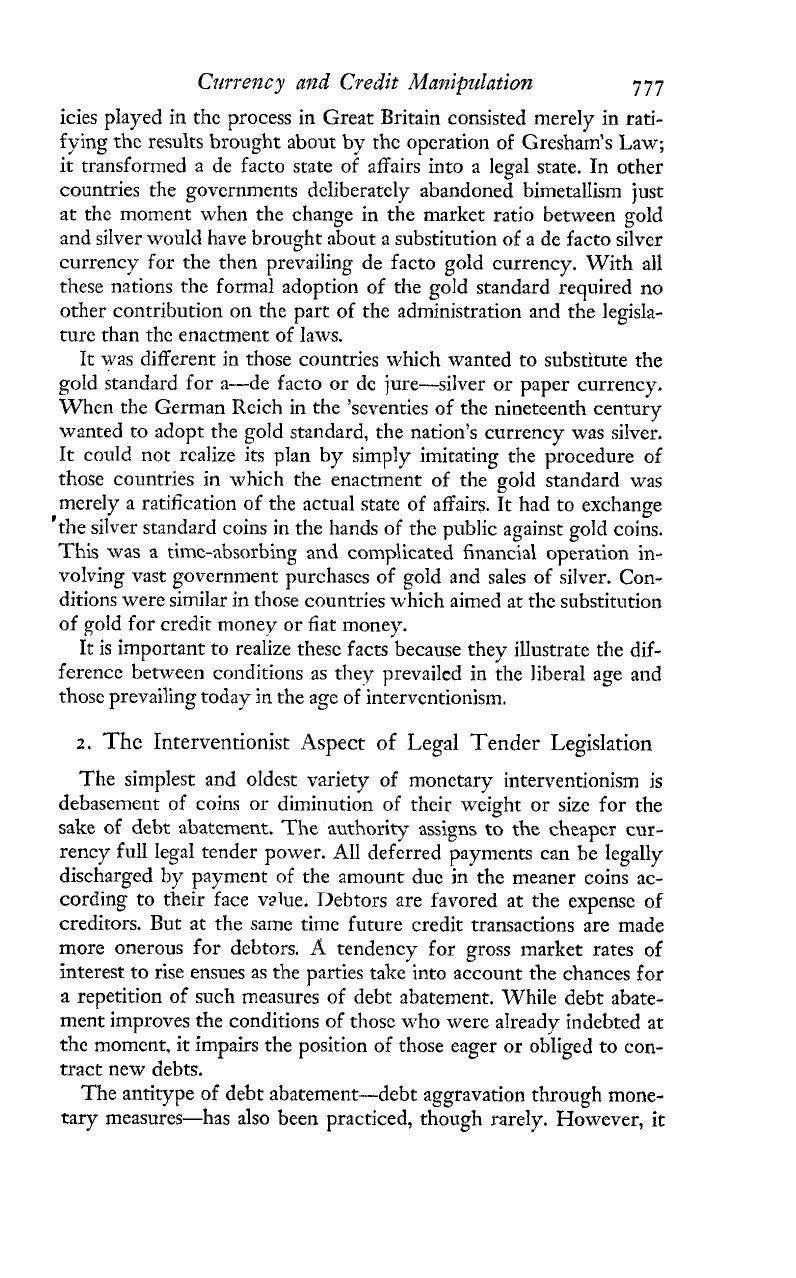
Crarency
a~zd
C~edit
Manipulation
icies played in the process in Great Britain consisted merely in rati-
fying thc results brought about by the operation of Gresham's Law;
it transformed a de facto state of affairs into a legal state. In other
countries the governments deliberately abandoned bimetalIism just
at the moment when the change in the market ratio between gold
and silver would have brought about a substitution of a de facto silver
currency for the then prevailing de facto gold currency. With all
these nations the formal adoption of the gold standard required no
other contribution on the part of the administration and the legisla-
ture than the enactment of laws.
It was different in those countries which wanted to substitute the
gold standard for a-de fact0 or dc jure-silver or paper currency.
When the German Reich in the 'seventies of the nineteenth century
wanted to adopt the gold standard, the nation's currency was silver.
It could not realize its plan by simply imitating the procedure of
those countries in which the enactment of the gold standard was
merely a ratification of the actual state of affairs. It had to exchange
'the silver standard coins in the hands of the public against gold coins.
This
was a time-absorbing and complicated financial operation in-
volving vast government of gold and sales of silver. Con-
ditions were similar in those countries which aimed at the substitution
of gold for credit money or fiat money.
It is important to realize these facts because they illustrate the dif-
ference between conditions as they prevailed in the liberal age and
those prevailing today in the age of interventionism.
2.
The
Interventionist Aspect of Legal Tender Legislation
The simplest and oldest variety of monetary interventionism is
debasement of coins or diminution of their weight or size for the
sake of debt abatement.
The
authority assigns
to
the
cheaper cur-
rency full legal tender power. All deferred payments can be legally
discharged by payment of the amount due in the meaner coins ac-
cording to their face vglue. Debtors are favored at the expense of
creditors. But at the same time future credit transactions are made
more onerous for debtors.
A
tendency for gross market rates of
interest to rise ensues as the parties take into account the chances for
a repetition of such measures of debt abatement. While debt abate-
ment improves the conditions of those who were already indebted at
the moment, it impairs the position of those eager or obliged to con-
tract new debts.
The antitype of debt abatement-debt aggravation through mone-
tary measures-has also been practiced, though rarely. However,
it
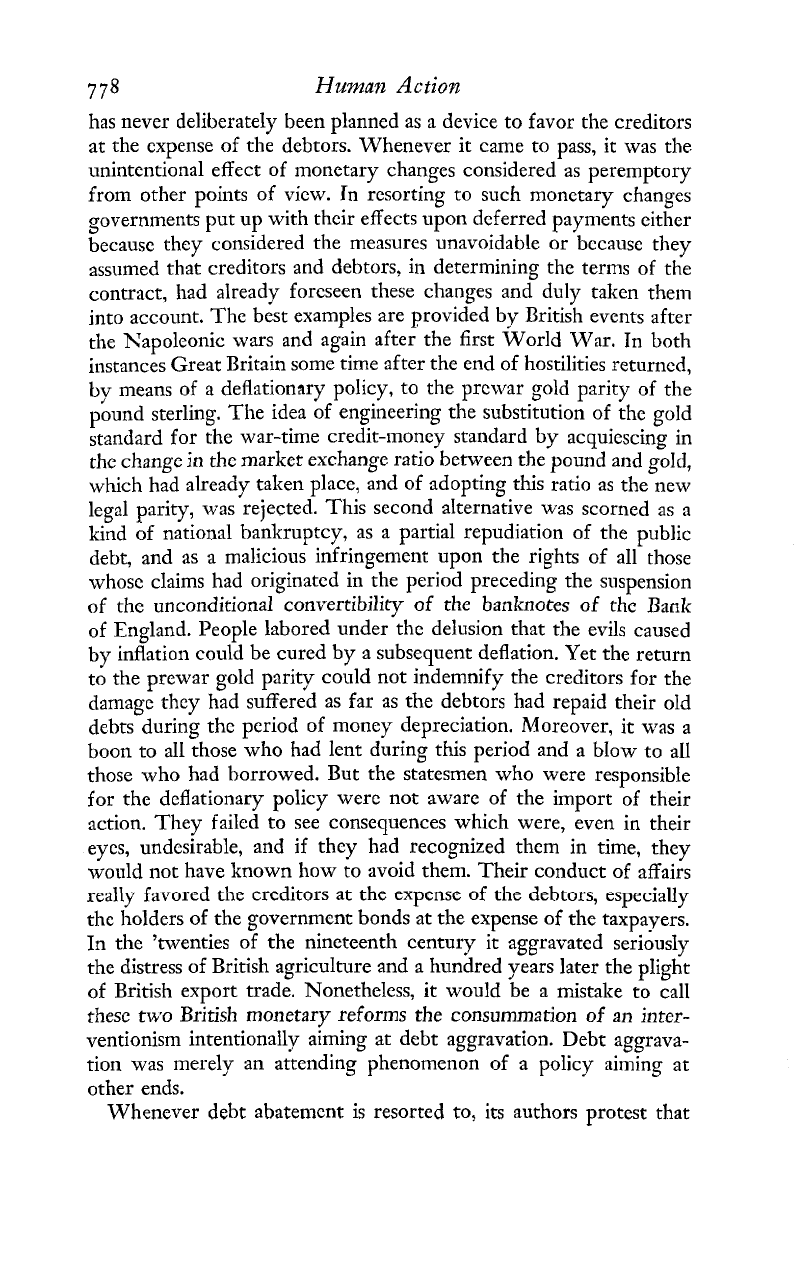
7
78
Human
Action
has never deliberately been planned as a device to favor the creditors
at the expense of the debtors. Whenever it came to pass, it was the
unintentional effect of monetary changes considered as peremptory
from other points of view. In resorting to such monetary changes
governments put up with their effects upon deferred payments either
because they considered the measures unavoidable or because they
assumed that creditors and debtors, in determining the terms of the
contract, had already foreseen these changes and duly taken them
into account. The best examples are provided by British events after
the Napoleonic wars and again after the first World War. In both
illstances Great Britain some time after the end of hostilities returned,
by
means of a deflationary policy, to the prewar gold parity of the
pound sterling. The idea of engineering the substitution of the gold
standard for the war-time credit-money standard by acquiescing in
the change
in
the market exchange ratio between the pound and gold,
which had already taken place, and of adopting this ratio as the new
legal parity, was rejected. This second alternative was scorned as a
kind of national bankruptcy, as a partial repudiation of the public
debt, and as
a
malicious infringement upon the rights of all those
whose claims had originated in the period preceding the suspension
of
the unconditional convertibility of the banknotes
of
the
Bank
of England. People labored under the delusion that the evils caused
by inflation could be cured
by
a subsequent deflation. Yet the return
to the prewar gold parity could not indemnify the creditors for the
damage they had suffered as far as the debtors had repaid their old
debts during the period of money depreciation. Moreover, it was a
boon to all those who had lent during this period and a bIow to all
those who had borrowed. But the statesmen who were responsible
for the deflationary policy were not aware of the import of their
action. They failed to see consequences which were, even in their
eyes, undesirable, and if they had recognized them in time, they
would not have known how to avoid them. Their conduct of affairs
really favored the creditors
at
the expense of the debtors, especially
the holders of the government bonds at the expense of the taxpayers.
In thc 'twenties of the nineteenth century
it
aggravated seriously
the distress of British agriculture and a h~mdred years later the plight
of British export trade. Nonetheless, it would be a mistake to call
these two British monetary reforms the consummation
of
an
inter-
ventionism intentionally aiming at debt aggravation. Debt aggrava-
tion was merely an attending phenomenon of a policy aiming at
other ends.
Whenever debt abatement is resorted to, its authors protest that
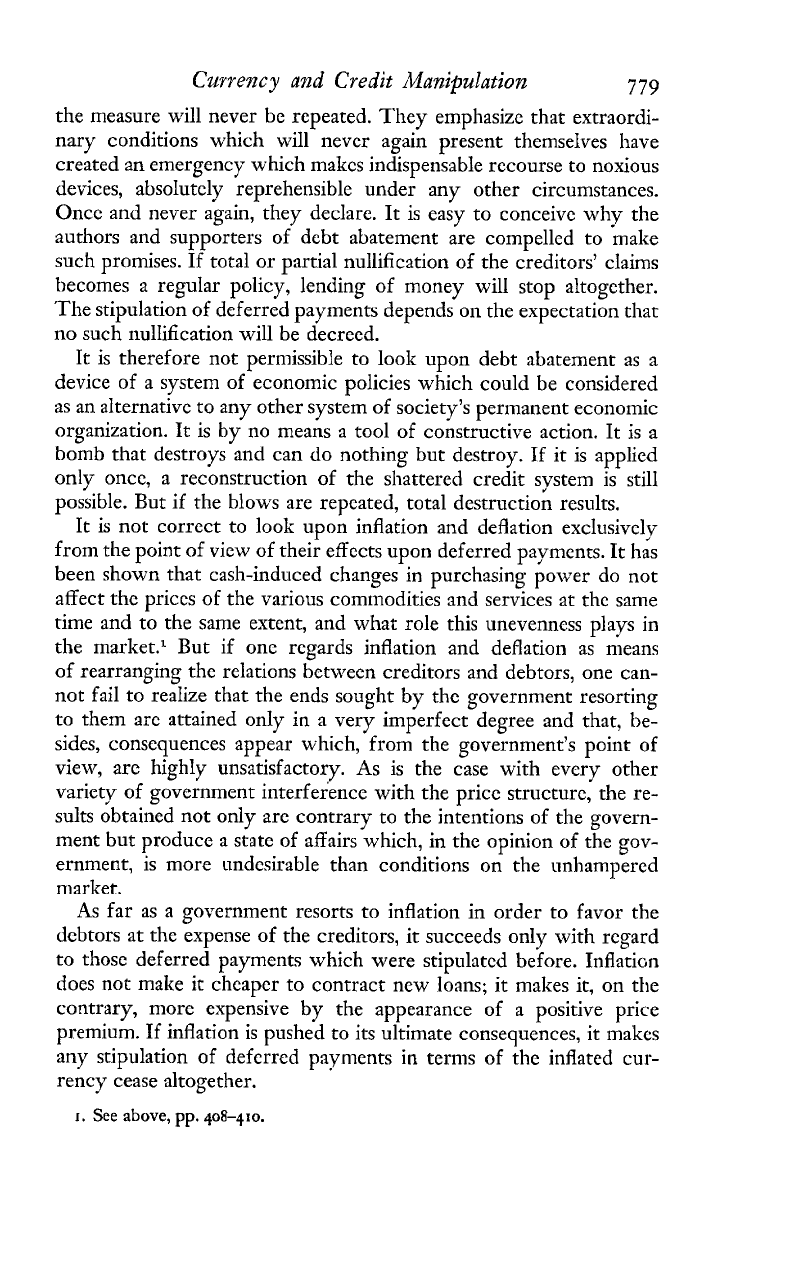
Currency and Credit
Manipulation
779
the measure will never be repeated. They emphasize that extraordi-
nary conditions which will never again present themselves have
created an emergency which makes indispensable recourse to noxious
devices, absoIutely reprehensible under any other circumstances.
Once and never again, they declare. It is easy to conceive why the
authors and supporters of debt abatement are compelled to hake
such promises. If total or partial nullification of the creditors' claims
1)ecomes a regular policy, lending of money will stop altogether.
'The stipulation of deferred payments depends on the expectation that
no such nulIification will be decreed.
It is therefore not permissible to look upon debt abatement as a
device of a system of economic policies which could be considered
as an alternative to any other system of society's permanent economic
organization. It is by no means a tool of constructive action. It is a
bomb that destroys and can do nothing but destroy. If it is applied
only once, a reconstruction of the shattered credit system is still
possible. But if the blows are repeated, total destruction results.
It
is
not correct to look upon inflation and deflation exclusively
from the point of view of their eff ects upon deferred payments. It has
been shown that cash-induced changes in purchasing power do not
affect the prices of the various commodities and services at the same
time and to the same extent, and what role this unevenness plays in
the market.l But if one regards inflation and deflation as means
of rearranging the relations between creditors and debtors, one can-
not fail to reaIize that the ends sought by the government resorting
to them are attained only in a very imperfect degree and that, be-
sides, consequences appear which, from the government's point of
view, are highly unsatisfactory. As is the case with every other
variety of government interference with the price structure, the re-
sults obtained not only are contrary to the intentions of the govern-
ment but produce a state of affairs which, in the opinion of the gov-
ernment, is more undesirable than conditions on the unhampered
market.
As far as a government resorts to inflation in order to favor the
debtors at the expense of the creditors, it succeeds only with regard
to those deferred payments which were stipulated before. Inflaticjn
does not make it cheaper to contract new loans; it makes it, on the
contrary, more expensive
by
the appearance of a positive price
premium. If inflation is pushed to its ultimate consequences, it makes
any stipulation of deferred payments in terms of the inflated cur-
rency cease altogether.
I.
See
above,
pp.
408-410.
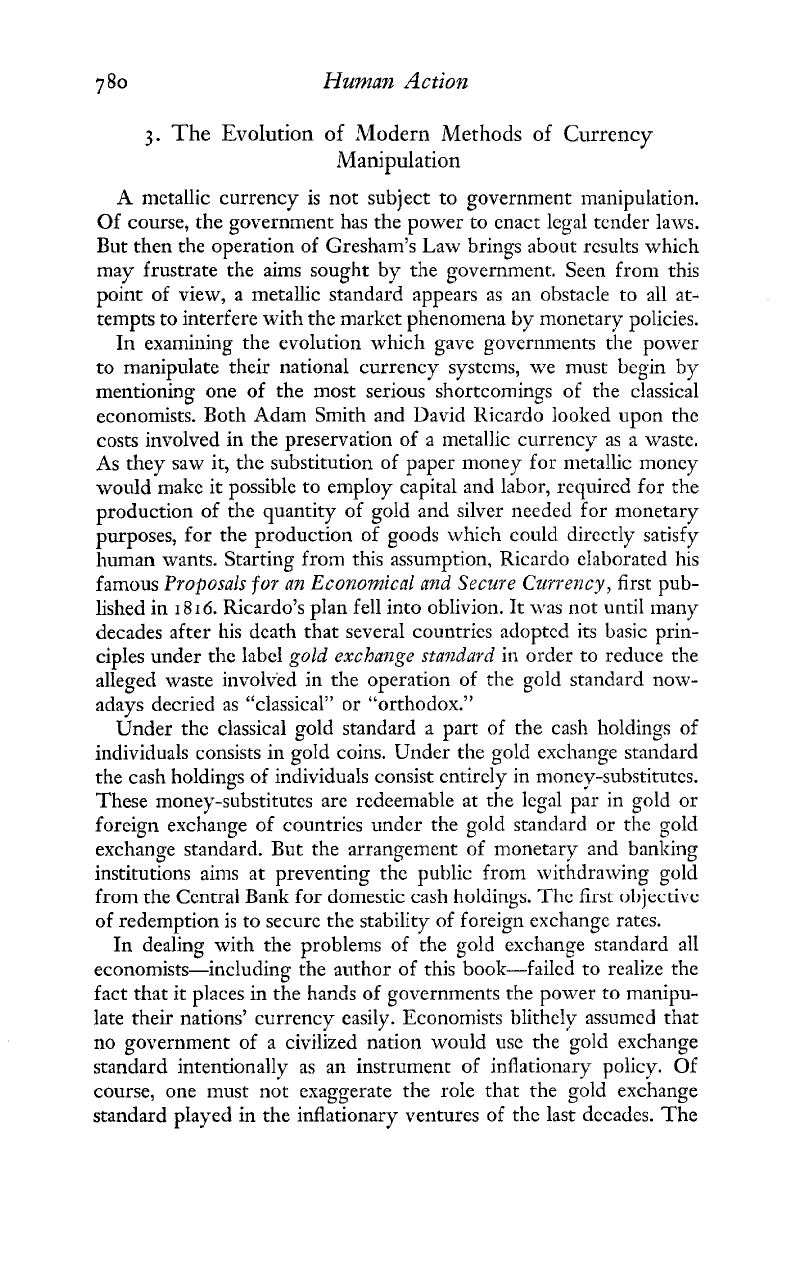
780
Human Action
3.
The
Evolution of Modern Methods of Currency
Manipulation
A
metallic currency is not subject to government manipulation.
Of course, the government has the power to enact legal tender laws.
But then the operation of Gresham's Law brings about results which
may frustrate the aims sought by the government. Seen from this
point
of
view, a metallic standard appears as an obstacle to all at-
tempts to interfere with the nlarkct phenomena by monetary policies.
In examining the evolution which gave governments the power
to manipulate their national currcncy systems, we must begin
by
mentioning one of the most serious shortcomings of the classical
economists. Both Adam Smith and David Ricardo looked upon the
costs involved in the preservation of a metallic currency as a waste.
As they saw it, the substitution of paper money for m&allic money
tvould make it possible to employ capital and labor, required for the
production of the quantity of gold and silver needed for monetary
purposes, for the production of goods which could dircctly satisfy
human wants. Starting from this assumption, Ricardo elaborated his
famous
Proposals for an Economical arzd Secure CZWI-ency,
first pub-
lished in
I
816.
Ricardo's plan fell into oblivion. It was not until many
decades after his death that several countries adopted its basic prin-
ciples under the label
gold exchange standard
in ordcr to reduce the
alleged waste involved in the operation of the gold standard now-
adays decried as "classical" or "orthodox."
Under the classical gold standard a part of the cash holdings of
individuals consists in gold coins. Under the gold exchange standard
the cash holdings of individuals consist entirely in money-substitutes.
These money-substitutes arc redeemable at the legal par in gold or
foreign exchange of countries under the gold standnrd or the gold
exchange standard. But the arrangement of monetary and banking
institutions aims at preventing thc public from withdrawing gold
from he Ccnrrai Iiank for domestic cash hoidings.
Tne
first
objecii\.c
of redemption is to secure the stability
of
foreign exchange rates.
In dealing with the problems of the gold exchange standard all
economists-including the author of this book-failed to realize the
fact that it places in the hands of governments the power to manipu-
late their nations' currency easily. Economists blithely assumed that
no government of a civilized nation would use the gold exchange
standard intentionally as an instrument of inflationary policy. Of
course, one must not exaggerate the role that the gold exchange
standard played in the inflationary ventures of the last decades. The
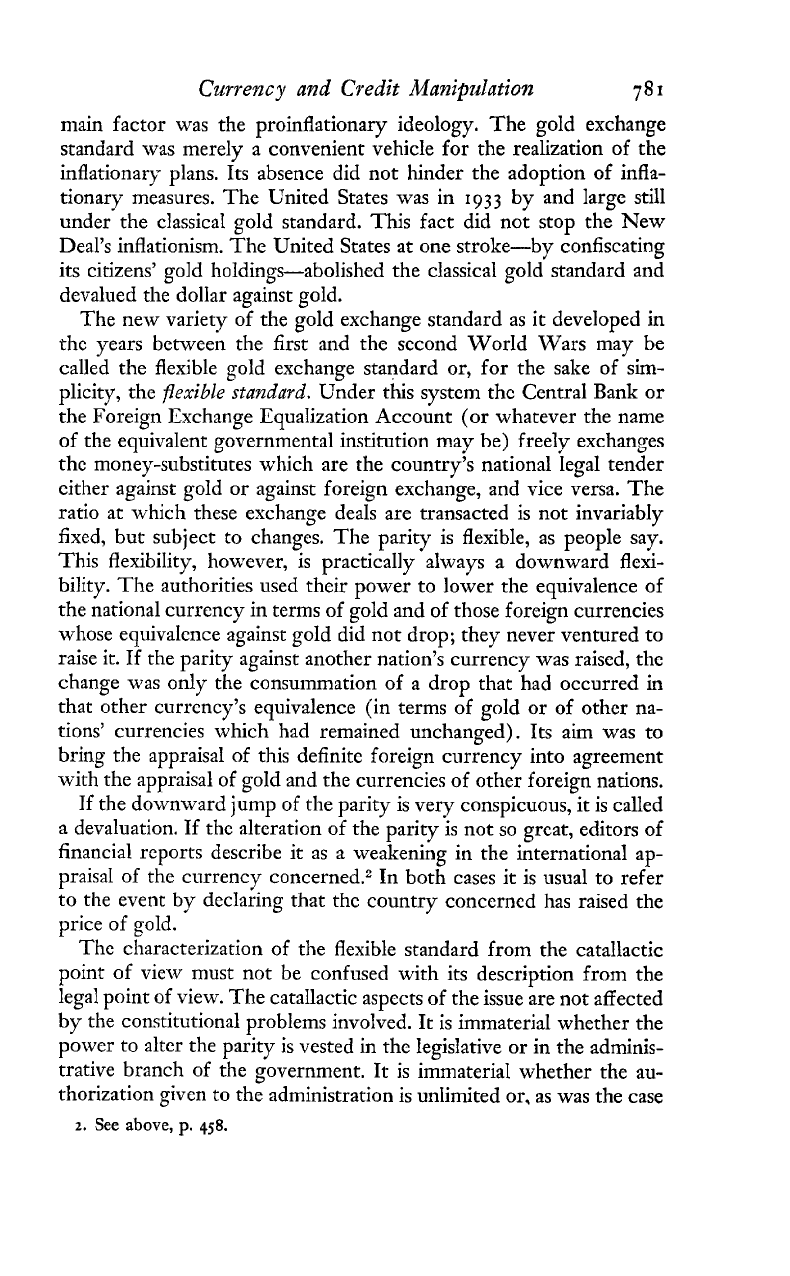
Currency
and
Credit
Manipulation
781
main factor was the proinflationary ideology. The gold exchange
standard was merely a convenient vehicle for the realization of the
inflationary plans. Its absence did not hinder the adoption of infla-
tionary measures. The United States was in
1933
by and large still
undcr the classicaI gold standard. This fact did not stop the New
Deal's inflationism. The United States at one stroke-by confiscating
its citizens' gold holdings-abolished the classical gold standard and
devalued the dollar against gold.
The new variety of the gold exchange standard as it developed in
the years between the first and the second World Wars may be
called the flexible gold exchange standard or, for the sake of sim-
plicity, the
flexible
standard.
Under this system the Central Bank or
the Foreign Exchange Equalization Account (or whatever the name
of the equivalent governmental institution may be) freely exchanges
the money-substitutes which are the country's national legal tender
either against gold or against foreign exchange, and vice versa. The
ratio at which these exchange deals are transacted is not invariably
fixed,
but subject to changes. The parity is flexible, as people say.
This flexibility, however, is practically always a downward flexi-
bility. The authorities used thcir power to lower the equivalence of
the national currency in terms of gold and of those foreign currencies
whose equivalcnce against gold did not drop; they never ventured to
raise it.
If
the parity against another nation's currency was raised, the
change was only the consummation of a drop that had occurred in
that other currency's equivalence (in terms of gold or of other na-
tions' currencies which had remained unchanged). Its aim was to
bring the appraisal of this definite foreign currency into agreement
with the appraisal of gold and the currencies of other foreign nations.
If the downward jump of the parity is very conspicuous, it is called
a devaluation. If the alteration of the parity is not so great, editors of
financial reports describe it as a weakening in the international ap-
praisaI of the currency ~oncerned.~ In both cases it is usual to refer
to the event
by
deciaring that fhc country concerned has raised the
price of gold.
The characterization of the flexible standard from the catallactic
point of view must not be confused with its description from the
legal point of view. The cataIlactic aspccts of the issue are not affected
by the constitutional problems involved. It is immaterial whether the
power to alter the parity is vested in the Iegislative or in the adminis-
trative branch of the government. It is immateriaI whether the au-
thorization given to the administration is unlimited or, as was the case
2.
See
above,
p.
458.
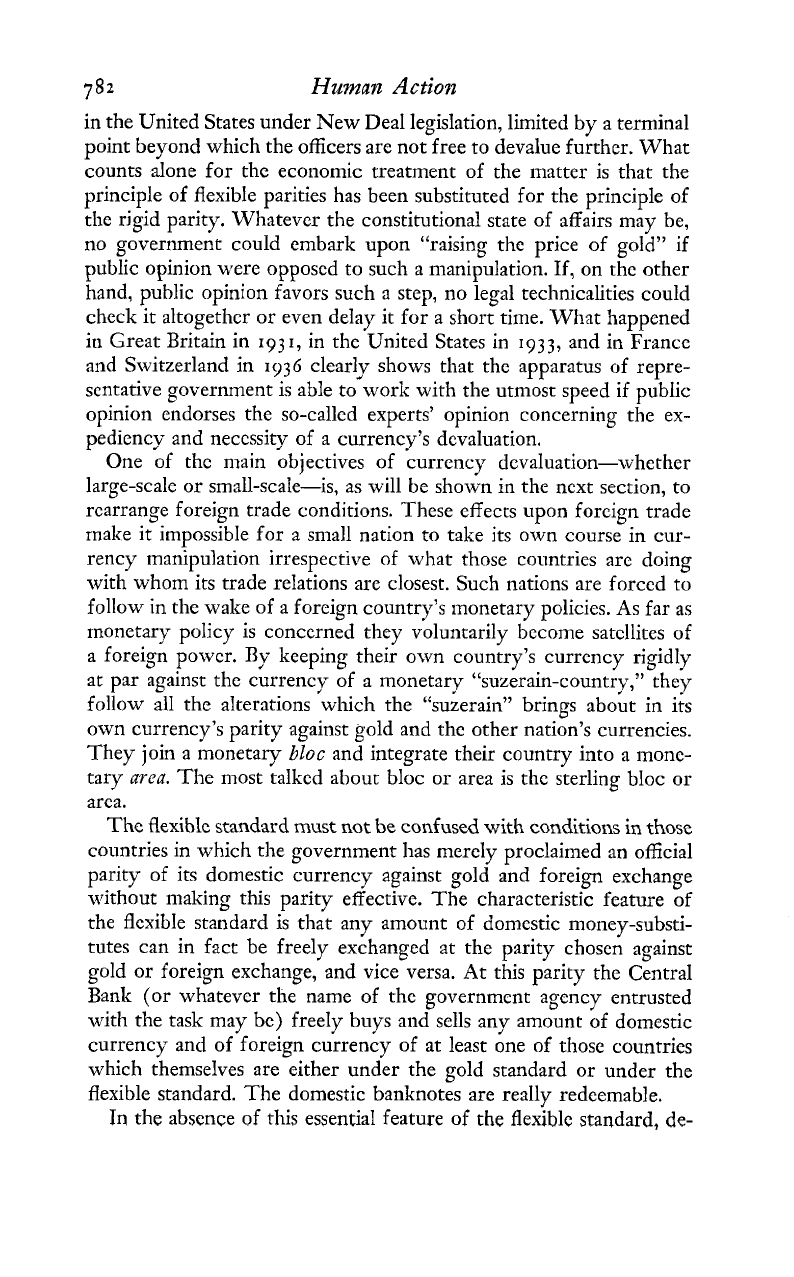
782
Human
Action
in the United States under New Deal legislation, limited by a terminal
point beyond which the officers are not free to devalue further. What
counts alone for the economic treatment of the matter is that the
principle of flexible parities has been substituted for the principle of
the rigid parity. Whatever the constitutional state of affairs may be,
no government could embark upon "raising the price of gold" if
public opinion were opposed to such a manipulation. If, on the other
hand, public opinion favors such a step, no legal technicalities could
check it altogethcr or even delay it for a short time. What happened
in Great Britain in 1931, in the United States in 1933, and in France
and Switzerland in 1936 clearly shows that the apparatus of repre-
scntative government is able to work with the utmost speed if public
opinion endorses the so-called experts' opinion concerning the ex-
pediency and necessity of a currency's dcvaluation.
One of the main objectives of currency devaluation-whether
large-scale or small-scale-is, as will be shown in the next section, to
rearrange foreign trade conditions. These effects upon foreign trade
rnake
it
impossible for
a
small nation to take its own course in cur-
rency manipulation irrespective
of
what those countries are doing
with whom its trade relations are closest. Such nations are forced
to
follow
in
the wake of a foreign country's monetary policies. As far as
monetary policy is concerned they voluntarily become satellites of
a foreign power. By keeping their own country's currency rigidly
at par against the currency of a monetary "suzerain-country," they
follow all the alrerations which the "suzerain" brings about in i;s
own currency's parity against gold and the other nation's currencies.
They join a monetary
bloc
and integrate their country into a mone-
tary
area.
The most talked about bloc or area is the sterling bloc or
area.
Thc
flexible standard must not
be
confused with conditions
in
those
countries in which the government has merely proclaimed an official
parity of its domestic currency against gold and foreign exchange
without making this parity effective. The characteristic feature of
the flexible standard is that any amount of domestic money-substi-
tutes can in fact be freely exchanged at the parity chosen against
gold or foreign exchange, and vice versa. At this parity the Central
Bank (or whatever the name of the government agency entrusted
with the task may be) freely buys and sells any amount of domestic
currency and of foreign currency of at least one of those countries
which themselves are either under the gold standard or under the
flexible standard. The domestic banknotes are really redeemable.
In
the absence of this essentiaI feature of the flexible standard,
de-
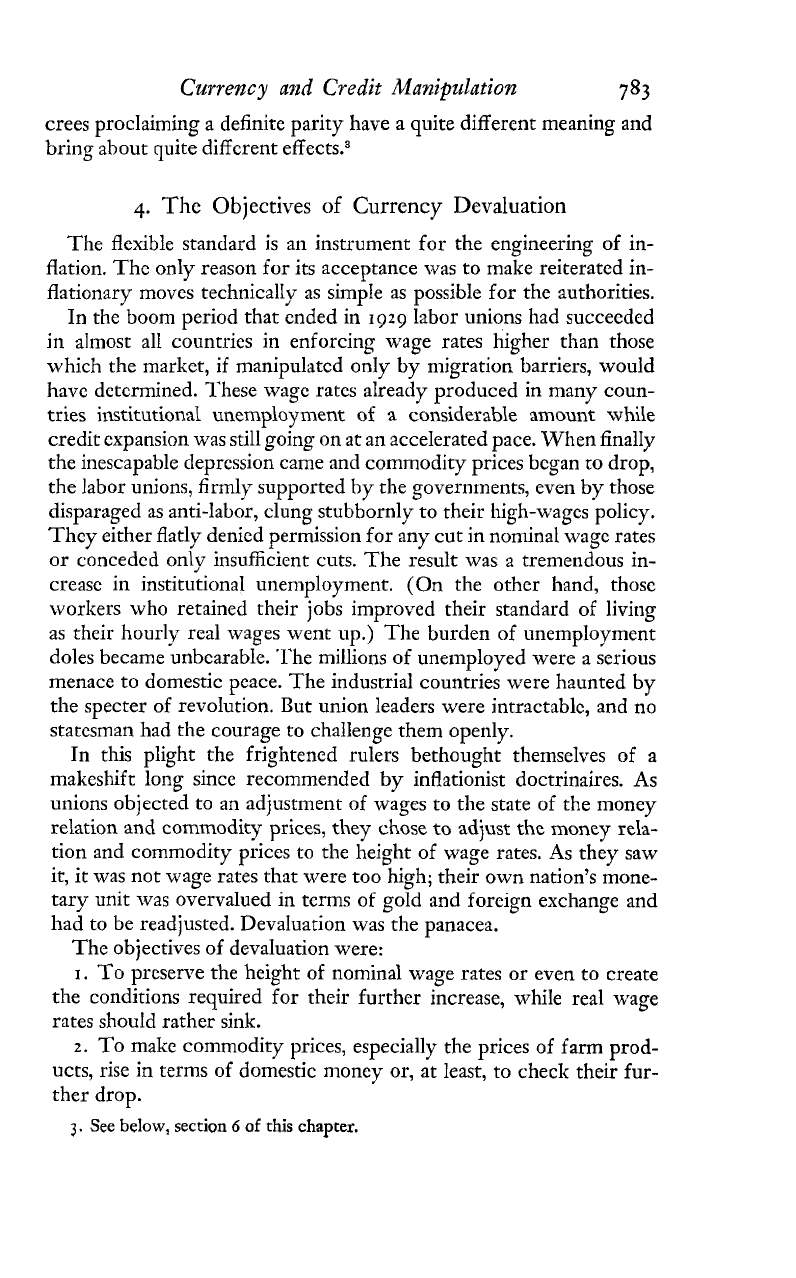
Currency and Credit Manipulation
783
Crees proclaiming a definite parity have a quite different meaning and
bring about quite different
effect^.^
4.
The
Objectives
of
Currency Devaluation
The flexible standard is an instrument for the engineering of in-
flation. The only reason for its acceptance was to make reiterated in-
flationary moves technically as simpIe as possible for the authorities.
In the boom period that ended in
1929
labor unions had succeeded
in almost all countries in enforcing wage rates higher than those
which the market, if rnanipulatcd only by migration barriers, would
have determined. These wage rates already produced in many coun-
tries institutional unemployment of
a
considerable
amount
while
credit expansion was still going on at an accelerated pace. When finally
the inescapable depression came and commodity prices began to drop,
the labor unions, firmly supported by the governments, even by those
disparaged as anti-labor, clung stubbornly to their high-wages policy.
They either flatly denied permission for any cut in nominal wage rates
or conceded only insufficient cuts. The result was a tremendous in-
crease in institutional unemployment. (On the other hand, those
workers who retained their jobs improved their standard of living
as their hourly real wages went up.) The burden of unemployment
doles became unbearable. The millions of unemployed were a serious
menace to domestic peace. The industrial countries were haunted by
the specter of revolution. But union leaders were intractable, and no
statesman had the courage to challenge them openly.
In this plight the frightened rulers bethought themselves of
a
makeshift long since recommended by inflationist doctrinaires. As
unions objected to an adjustment of wages to the state of the money
relation and commodity prices, they chose to adjust
the money
rela-
tion and commodity prices to the height of wage rates. As they saw
it, it was not wage rates that were too high; their own nation's mone-
tary unit was overvalued in terms of gold and foreign exchange and
had to be readjusted. Devaluation was the panacea.
The objectives of devaluation were:
I.
To presen7e the height of nominal wage rates or even to create
the conditions required for their further increase, while real wage
rates should rather sink.
2.
To make commodity prices, especially the prices of farm prod-
ucts, rise
in
terms of domestic money or, at least, to check their fur-
ther drop.
3.
See
below,
section
6
of
this
chapter.
